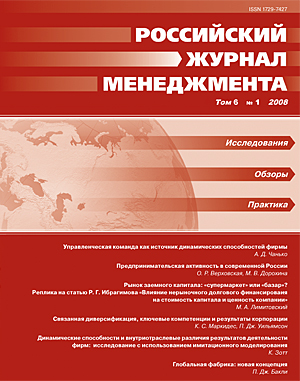Top Management Team as a Source of Dynamic Capabilities of the Firm
Abstract
This methodological paper is devoted to theoretical analysis of dynamic capabilities sources at micro-level of organization as a social system. The author makes an attempt to integrate theoretical approaches from various disciplines and develop a comprehensive framework to analyze factors of firm’s successful development under uncertainty. The novelty of proposed approach consists in the comparison of psychological concepts of creative talents and personal behavioral characteristics, sociological and psychological models of successful managerial teams, characteristics of managers and companies with dynamic capabilities. This analysis allows the author to specify the agenda of empirical and multidisciplinary research and pioneer with the idea that a balance of three behavioral modes — reactive, active and proactive — is crucial for effective performance of managerial teams and organizations in dynamic environment.
Keywords:
management team, dynamic capabilities, behavior, reactivity, activity, proactivity, balance
Downloads
References
REFERENCES IN LATIN ALPHABET
Downloads
Published
How to Cite
Issue
Section
License
Articles of the Russian Management Journal are open access distributed under the terms of the License Agreement with Saint Petersburg State University, which permits to the authors unrestricted distribution and self-archiving free of charge.





